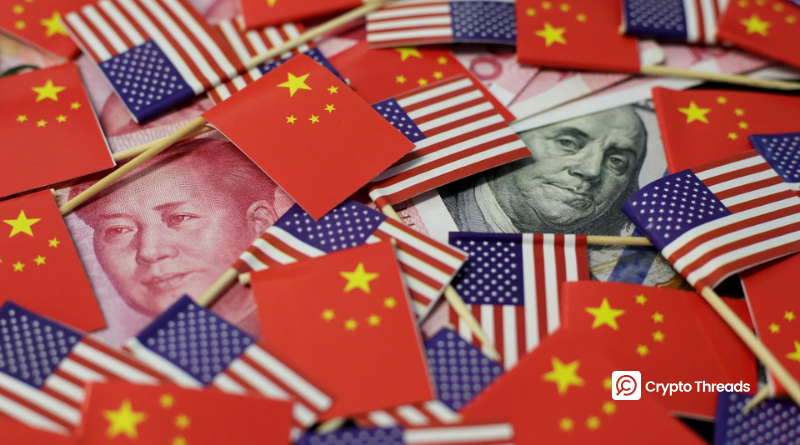Trump Confirms US Is in a Trade War With China After Tariff Threats
- President Donald Trump confirmed the United States is in an active trade war with China.
- The announcement followed his threat to impose a 100% tariff on all Chinese imports.
- US Treasury Secretary Scott Bessent condemned China’s export restrictions on key minerals.
- The escalating tariffs are impacting the Bitcoin mining industry due to higher import costs.
- Despite challenges, no major US Bitcoin miners have moved operations overseas.
US President Donald Trump has officially confirmed that the United States is engaged in a trade war with China, marking a significant escalation in economic tensions between the two global powers. Speaking to reporters at the White House, Trump responded to a question about whether the US was preparing for a trade war by stating, “Well, we’re in one now.”
The president’s remarks came after he threatened to impose a 100% tariff on all Chinese imports last week, a move that could have far-reaching implications for global trade and the financial markets. “If we didn’t have tariffs, we would be exposed as being a nothing, we would have no defense,” Trump said, framing the measure as essential for America’s national security.

Trump’s earlier comments on social media had already rattled markets, triggering a sharp crypto sell-off that saw Bitcoin plunge from around $121,560 to below $103,000 in just a few hours. Analysts attributed the market shock to both the tariff announcement and growing fears of worsening US-China economic tensions.
The latest escalation followed China’s decision to tighten export controls on rare earth minerals, which are vital for manufacturing computer chips and advanced electronics. Trump said his proposed 100% tariffs were a direct response to Beijing’s restrictions, emphasizing that the US would not remain passive as China sought to leverage its control over critical supply chains.
Despite the fiery rhetoric, markets have shown limited immediate reaction this time. According to CoinGecko data, Bitcoin rose by 0.1% in the hour following Trump’s statement, suggesting that investors may have already priced in the impact of the tariff threats.
US Treasury Secretary Scott Bessent also weighed in on Wednesday, condemning China’s actions and warning that Beijing’s trade policies could backfire. “If some in the Chinese government want to slow down the global economy through disappointing actions and economic coercion, the Chinese economy will be hurt the most — and make no mistake: this is China versus the world,” Bessent said. He added that the United States and its allies “will neither be commanded nor controlled by a group of bureaucrats in Beijing.”
However, the ripple effects of the trade war are already being felt in the Bitcoin mining industry. Trump’s tariffs on imports from several Asian nations have made it more expensive for US-based mining firms to purchase specialized hardware. Import taxes currently stand at 57.6% for mining machines from China and 21.6% for those from Indonesia, Malaysia, and Thailand. These increased costs have raised operational expenses for American miners, squeezing profit margins at a time when competition for mining rewards is fierce.
Compounding the issue, the US Customs and Border Protection agency has previously seized thousands of Bitcoin miners, mistakenly identifying them as illegally imported radio frequency devices. Despite these challenges, industry analysts note that no major US-based mining companies have relocated their operations overseas — an indication that firms remain committed to maintaining domestic infrastructure, even amid rising costs.
Final Thought
Trump’s confirmation that the US is now in a trade war with China underscores the growing geopolitical and economic rift between the two nations. While the broader markets have remained relatively stable for now, the implications of prolonged tariffs could ripple across sectors — from traditional manufacturing to emerging industries like Bitcoin mining. As both sides dig in, businesses and investors alike will be watching closely for signs of escalation or resolution in what could become one of the defining economic confrontations of the decade.



